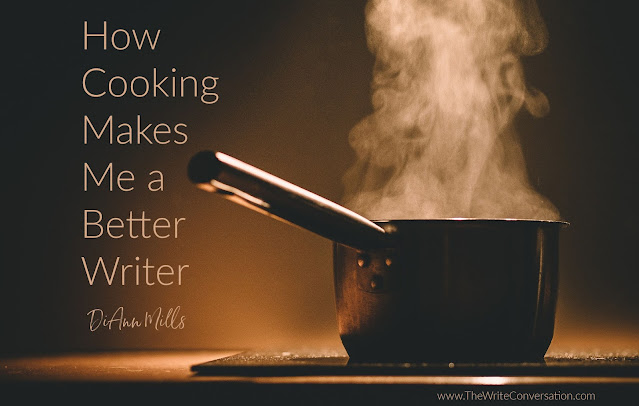by DiAnn Mills @DiAnnMills
I like to cook and bake almost as much as I love writing. Spending time in the kitchen is relaxing, satisfying, and hopefully the results are tasty. I’ve discovered my passion for writing has a lot in common with food prep. Cooking makes me a better writer.
Look at the following comparisons, and I think you’ll understand what I mean.
Decide on a recipe
When the mood strikes, I must decide what to cook. Similarly, I must choose a storyline. Contemporary romantic suspense is my preferred genre, and my writing recipe also needs an intriguing story line.
The right ingredients
For a taste treat to win over others, decisions are in order. Who are my characters? What is their problem? Where is my story set?
Measure precisely
Story needs a balance of action and narrative woven with character emotions. In turn those emotions transfer to a reader’s experience. Growth and change happen when the character’s method of handling stress leads to critical errors and new measures of problem-solving flow fresh. How many mistakes will my character face? Can the reader see measurable growth?
Cut and dice
Editing is the part of story writing where scenes are cut and diced. Making a story stronger means weak plot points must be slashed. The use of strong verbs and powerful nouns establishes a meatier story than sliding in adjectives and adverbs. Is the dialogue in character? Is the setting antagonistic so the character is forced to struggle? Where can a sentence be condensed to a phrase or a phrase to a single word?
Don’t be afraid to vary a recipe
Story is king. Nothing reigns over story. While a writer follows rules and guidelines taught by professionals in the industry, sometimes those very same principles need to be tweaked. Try something new. Does it work?
Stir thoroughly
Quality writing means to shake up my characters. Force them to step into the unknown and forbidden. Throw in an ingredient midway that forever changes the story. Get your characters dirty. Make them smile, cry, angry, sad, and lonely. Always create the unpredictable.
Bake
Every story needs time to bake. When I walk away from my computer and refuse to open the file (oven door) for a specific time, the result is a fresh concept, and I can tell if it’s finished or needs a little more time.
Serve
A writer never knows how readers will respond to a story. I can only work diligently and hope the book will be delicious, satisfying, and leave the reader wanting for more.
Are you ready to cook up a story?
TWEETABLE
DiAnn Mills is a bestselling author who believes her readers should expect an adventure. She creates action-packed, suspense-filled novels to thrill readers. Her titles have appeared on the CBA and ECPA bestseller lists; won two Christy Awards; and been finalists for the RITA, Daphne Du Maurier, Inspirational Readers’ Choice, and Carol award contests.
She is the former director of the Blue Ridge Mountain Christian Writers Conference, Mountainside Marketing Retreat, and Mountainside Novelist Retreat with social media specialist Edie Melson. Connect here: DiAnnMills.com


DiAnn, Thank you for a wonderful analogy and way to define the "ingredients'. I love both also.
ReplyDeleteLisa, thank you! I love them both too.
DeleteLove this analogy. It's helping me 'cook up' a plot for my WIP.
ReplyDeleteSally Jo - Cookin' up a plot is what we do! Thanks for commenting.
DeleteFun reminder of what to be doing as a writer....slipped in like vegetables into the sauce. ;)
ReplyDeleteThanks DiAnn!
Thanks, Chris. Love your analogy!
DeleteLove your analogy.
ReplyDeleteWhat a great comparison, DiAnn! Thank you for sharing with all of us. Truly enjoyed it.
ReplyDeleteThanks, Diane and thanks for commenting!
ReplyDeleteWhat a great analogy! Thank you for the insight!
ReplyDeleteBlessings!
Thank you, Edwina.
DeleteI enjoy cooking as well and I don't mind experimenting! I enjoyed your analogy and appreciate the wisdom you shared.
ReplyDelete